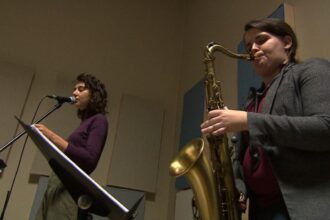In the shadow of the ongoing battle against seasonal respiratory illnesses, Ottawa Public Health has launched a concerted effort to protect the city’s most vulnerable residents. The health authority is now actively encouraging adults aged 60 and older to receive the respiratory syncytial virus (RSV) vaccine, marking a significant shift in preventative health measures for the senior population.
“RSV isn’t just a concern for infants and young children—it poses a serious risk to older adults, particularly those with underlying health conditions,” said Dr. Vera Etches, Ottawa’s Medical Officer of Health, during yesterday’s public health briefing. “What many don’t realize is that RSV hospitalizes thousands of seniors annually across Canada, yet remains largely under-recognized as a threat to this demographic.”
The vaccine, which received Health Canada approval earlier this year, represents the first time older adults have had access to protection against RSV. The virus, which typically causes mild cold-like symptoms in healthy adults, can lead to severe respiratory complications including pneumonia and bronchiolitis in vulnerable populations—particularly those over 65 or with compromised immune systems.
According to CO24 News, Ottawa Public Health data shows that RSV-related hospitalizations among seniors increased by nearly 18 percent last winter season, underscoring the urgency behind this vaccination campaign. The timing is strategic, aimed at building immunity before the peak of respiratory virus season, which typically intensifies from November through March.
Unlike the publicly funded influenza vaccine, the RSV vaccine currently requires out-of-pocket payment ranging from $230 to $270, though coverage is available through some private insurance plans. This financial barrier has prompted advocacy groups to push for its inclusion in provincial immunization programs, similar to what’s being discussed in broader Canadian healthcare policy circles.
“We’re seeing encouraging uptake among the 60-plus demographic, but cost remains a significant obstacle for many fixed-income seniors,” noted Maria Leonov, director of senior services at the Ottawa Community Health Centre. “Those who can access the vaccine are reporting peace of mind, especially after the challenging respiratory seasons we’ve experienced recently.”
Health officials emphasize that the RSV vaccine can be administered concurrently with this year’s COVID-19 and influenza vaccines, streamlining protection for seniors facing the triple threat of respiratory viruses. Local pharmacies and healthcare providers have begun stocking the vaccine, with appointment availability expanding throughout October.
The campaign aligns with similar initiatives across Ontario, where public health authorities are increasingly recognizing RSV’s impact on healthcare system capacity during winter months. Hospital administrators report that reducing RSV cases among seniors could significantly alleviate emergency department congestion during peak respiratory illness periods.
For seniors considering vaccination, Ottawa Public Health recommends consulting with healthcare providers about potential benefits and risks, particularly for those with chronic conditions like COPD, asthma, or heart disease—conditions that substantially increase complications from RSV infection.
As we enter another respiratory illness season with healthcare resources still stretched thin, one question remains particularly relevant: Will preventative measures like the RSV vaccine for seniors become standard practice in our approach to protecting vulnerable populations, or will financial barriers continue to create inequities in access to this potentially life-saving intervention?







